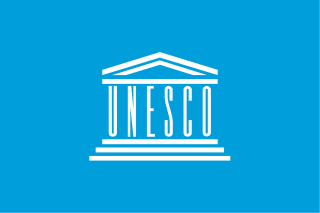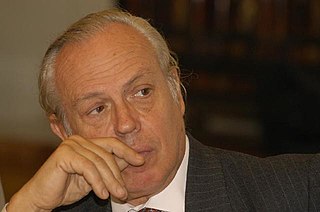Freedom of the press or freedom of the media is the fundamental principle that communication and expression through various media, including printed and electronic media, especially published materials, should be considered a right to be exercised freely. Such freedom implies the absence of interference from an overreaching state; its preservation may be sought through a constitution or other legal protection and security. It is in opposition to paid press, where communities, police organizations, and governments are paid for their copyrights.

Seán MacBride was an Irish Clann na Poblachta politician who served as Minister for External Affairs from 1948 to 1951, Leader of Clann na Poblachta from 1946 to 1965 and Chief of Staff of the IRA from 1936 to 1937. He served as a Teachta Dála (TD) from 1947 to 1957.

Reporters Without Borders is an international non-profit and non-governmental organization headquartered in Paris, which focuses on safeguarding the right to freedom of information. It describes its advocacy as founded on the belief that everyone requires access to the news and information, in line with Article 19 of the Universal Declaration of Human Rights that recognises the right to receive and share information regardless of frontiers, along with other international rights charters. RSF has consultative status at the United Nations, UNESCO, the Council of Europe, and the International Organisation of the Francophonie.
Development communication refers to the use of communication to facilitate social development. Development communication engages stakeholders and policy makers, establishes conducive environments, assesses risks and opportunities and promotes information exchange to create positive social change via sustainable development. Development communication techniques include information dissemination and education, behavior change, social marketing, social mobilization, media advocacy, communication for social change, and community participation.

Freedom of information is freedom of a person or people to publish and have access to information. Access to information is the ability for an individual to seek, receive and impart information effectively. As articulated by UNESCO, it encompasses
"scientific, indigenous, and traditional knowledge; freedom of information, building of open knowledge resources, including open Internet and open standards, and open access and availability of data; preservation of digital heritage; respect for cultural and linguistic diversity, such as fostering access to local content in accessible languages; quality education for all, including lifelong and e-learning; diffusion of new media and information literacy and skills, and social inclusion online, including addressing inequalities based on skills, education, gender, age, race, ethnicity, and accessibility by those with disabilities; and the development of connectivity and affordable ICTs, including mobile, the Internet, and broadband infrastructures".
The New World Information and Communication Order is a term coined in a debate over media representations of the developing world in UNESCO in the late 1970s early 1980s. The NWICO movement was part of a broader effort to formally tackle global economic inequality that was viewed as a legacy of imperialism upon the global south.

Amadou-Mahtar M'Bow GCIH is a Senegalese retired civil servant and former Director-General of UNESCO. Born in Dakar, M'bow served in France and North Africa during World War II after volunteering for the French Army, also serving with the Free French, and finally in the French Air Force. After the end of the war, he studied geography at the Sorbonne University in Paris. He served at UNESCO Headquarters in Paris from 1953 to 1987.

Human rights in Kyrgyzstan improved after the ouster of President Askar Akayev in the 2005 Tulip Revolution and the installment of a more democratic government under Roza Otunbayeva. While the country is performing well compared to other states in Central Asia, many human rights violations still take place. While LGBT rights have been declining in recent years, freedom of press has been improving.

The International Peace Bureau, founded in 1891, is one of the world's oldest international peace federations. The organisation was awarded the Nobel Peace Prize in 1910 for acting "as a link between the peace societies of the various countries". In 1913, Henri La Fontaine was also awarded the Prize "[For his work as] head of the International Peace Bureau". As of 2012, eleven other Nobel Peace Prize laureates have been members of the IPB.
The knowledge divide is the gap between those who can find, create, manage, process, and disseminate information or knowledge, and those who are impaired in this process. According to a 2005 UNESCO World Report, the rise in the 21st century of a global information society has resulted in the emergence of knowledge as a valuable resource, increasingly determining who has access to power and profit. The rapid dissemination of information on a potentially global scale as a result of new information media and the globally uneven ability to assimilate knowledge and information has resulted in potentially expanding gaps in knowledge between individuals and nations. The digital divide is an extension of the knowledge divide, dividing people who have access to the internet and those who do not. The knowledge divide also represents the inequalities of knowledge among different identities, including but not limited to race, economic status, and gender.
Source protection, sometimes also referred to as source confidentiality or in the U.S. as the reporter's privilege, is a right accorded to journalists under the laws of many countries, as well as under international law. It prohibits authorities, including the courts, from compelling a journalist to reveal the identity of an anonymous source for a story. The right is based on a recognition that without a strong guarantee of anonymity, many would be deterred from coming forward and sharing information of public interests with journalists.

The International Programme for the Development of Communication is a United Nations Educational, Scientific and Cultural Organization (UNESCO) programme aimed at strengthening the development of mass media in developing countries.
In communication, media are the outlets or tools used to store and deliver content; semantic information or subject matter of which the media contains. The term generally refers to components of the mass media communications industry, such as print media, publishing, news media, photography, cinema, broadcasting, digital media, and advertising. Each of these channels requires a specific, thus media-adequate approach to a successful transmission of content.

The United Nations Educational, Scientific and Cultural Organization is a specialized agency of the United Nations (UN) with the aim of promoting world peace and security through international cooperation in education, arts, sciences and culture. It has 194 member states and 12 associate members, as well as partners in the non-governmental, intergovernmental and private sector. Headquartered in Paris, France, UNESCO has 53 regional field offices and 199 national commissions.
Communication rights involve freedom of opinion and expression, democratic media governance, media ownership and media control, participation in one's own culture, linguistic rights, rights to education, privacy, assemble, and self-determination. They are also related inclusion and exclusion, quality and accessibility to means of communication.

Frank La Rue is a Guatemalan labor and human rights law expert and served as UN Special Rapporteur on the Promotion and Protection of the Right to Freedom of Opinion and Expression, from August 2008 to August 2014. Along with American human rights attorneys Anna Gallagher and Wallie Mason, Mr. La Rue is the founder of the Center for Legal Action for Human Rights (CALDH) and has been involved in the promotion of human rights for over 25 years. He was nominated for the 2004 Nobel Peace Prize by Mairead Corrigan, Northern Irish peace activist and 1976 laureate. Mr La Rue was previously the executive director of Robert F. Kennedy Human Rights Europe. He has also served as Assistant Director-General for Communication and Information at UNESCO.
Most Azerbaijanis receive their information from mainstream television, which is unswervingly pro-government and under strict government control. According to a 2012 report of the NGO "Institute for Reporters' Freedom and Safety (IRFS)" Azerbaijani citizens are unable to access objective and reliable news on human rights issues relevant to Azerbaijan and the population is under-informed about matters of public interest.

Roberto Savio is a journalist, communication expert, political commentator, activist for social and climate justice and advocate of global governance. He has spent most of his career with Inter Press Service (IPS), the news agency which he founded in 1964 along with Argentine journalist Pablo Piacentini.
Internet universality is a concept and framework adopted by UNESCO in 2015 to summarize their position on the internet. The concept recognizes that "the Internet is much more than infrastructure and applications; it is a network of economic and social interactions and relationships, which has the potential to enable human rights, empower individuals and communities, and facilitate sustainable development." The concept is based on four principles agreed upon by UNESCO member states: human rights, openness, accessibility, and multi-stakeholder participation, abbreviated as the R-O-A-M principles.

Safety of journalists is the ability journalists and media professionals to receive, produce and share information without facing physical or moral threats.
![World map representing Human Development Index categories (based on 2021 data, published in 2022)
.mw-parser-output figure[typeof="mw:File/Thumb"] .image-key>ol{margin-left:1.3em;margin-top:0}.mw-parser-output figure[typeof="mw:File/Thumb"] .image-key>ul{margin-top:0}.mw-parser-output figure[typeof="mw:File/Thumb"] .image-key li{page-break-inside:avoid;break-inside:avoid-column}@media(min-width:300px){.mw-parser-output figure[typeof="mw:File/Thumb"] .image-key,.mw-parser-output figure[typeof="mw:File/Thumb"] .image-key-wide{column-count:2}.mw-parser-output figure[typeof="mw:File/Thumb"] .image-key-narrow{column-count:1}}@media(min-width:450px){.mw-parser-output figure[typeof="mw:File/Thumb"] .image-key-wide{column-count:3}}
.mw-parser-output .plainlist ol,.mw-parser-output .plainlist ul{line-height:inherit;list-style:none;margin:0;padding:0}.mw-parser-output .plainlist ol li,.mw-parser-output .plainlist ul li{margin-bottom:0}
.mw-parser-output .legend{page-break-inside:avoid;break-inside:avoid-column}.mw-parser-output .legend-color{display:inline-block;min-width:1.25em;height:1.25em;line-height:1.25;margin:1px 0;text-align:center;border:1px solid black;background-color:transparent;color:black}.mw-parser-output .legend-text{}
Very high
High
Medium
Low
No data 2021-22 UN Human Development Report (multicolor).svg](http://upload.wikimedia.org/wikipedia/commons/thumb/4/44/2021-22_UN_Human_Development_Report_%28multicolor%29.svg/330px-2021-22_UN_Human_Development_Report_%28multicolor%29.svg.png)










